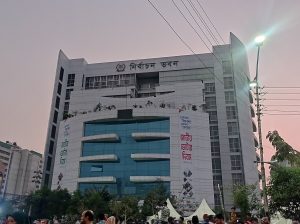Following the controversial elections to parliament in January, Bangladesh’s Election Commission (EC) is set to organize elections to upazila parishads (subdistrict, local bodies) in multiple phases from May 8.
The “local government elections are completely open. Anyone can participate,” the ruling Awami League’s General Secretary Obaidul Quader claimed. However, Bangladesh’s opposition parties are not convinced by the AL leader’s assurance. They do not believe the EC can organize free and fair elections under the current government in Bangladesh. Many are boycotting the election.
These include the opposition Bangladesh Nationalist Party (BNP), which had also boycotted the January general election. The BNP announced that it is boycotting the “farcical election” to the upazila parishads and will not contest an election under a “subservient” EC.
In addition to the BNP and other parties, the Bangladesh Communist Party, which was formerly allied with the AL, as well as the rightwing Islami Andolan Bangladesh are staying away from the election as they too expect that it will not be free and fair.
Upazilas are sub-units of districts and form the second tier of government administration after the districts. There are currently 495 upazilas in Bangladesh. Upazila parishad officials are responsible for organizing, implementing, and coordinating the government’s development initiatives, delegating public services to the people, as well as resolving social and environmental issues.
Traditionally, participation in upazila elections provided Bangladeshi political parties with opportunities to build grassroots leadership, expand public engagement at local levels, and assert influence into the lower tiers of the government.
The BNP’s decision to boycott the upazila parishad elections would therefore adversely impact the party “for a long time,” the AL’s Quader said.
Explaining the BNP’s decision to boycott the upazila elections, Ruhul Kabir Rizvi, the BNP’s senior joint secretary, told The Diplomat that “engaging in a prearranged elections is a political offense that only serves to validate an authoritarian political system that has been subverting peoples’ right to vote for over a decade.”
However, the BNP’s boycott of successive elections may be weakening its support at the grassroots level and facilitating the AL’s consolidation of power at all levels. Several BNP grassroots activists have, therefore, called on the party to participate in the upazila elections. At least 73 BNP leaders who decided to participate in the upazila elections have been expelled from the party.
Dismissing criticism of the BNP boycott decision, the BNP’s Information and Technological Affairs Secretary A.K.M. Wahinduzzaman told The Diplomat that it is a calculated move by the party aimed at undercutting the authority of the current authoritarian regime, its “claim to represent the will of the people and deny it the appearance of legitimacy that comes with its practice of rigging elections.”
By boycotting these elections, BNP hopes to mobilize public support for institutional change and democratic reform, while undermining the legitimacy of the current authoritarian government, Wahiduzzmaan said.
Going forward, the BNP’s election boycott will have immediate and longer-term impacts on the country. First, the BNP’s decision to boycott the local government elections is part of its plans to organize a larger political and cultural movement against the AL’s political repression and authoritarianism. It has taken an ambiguous position on the ongoing “Boycott Indian Products” campaign in Bangladesh, spearheaded by Bangladesh’s most influential political YouTuber Pinaki Bhattacharya in criticism of India’s unconditional support to the AL. Officially the BNP does not support the campaign to boycott Indian products in Bangladesh but unofficially, it does not mind if its activists participate in the campaign, which is slowly gathering steam across the country.
Second, the BNP’s boycott of the upazila parishad elections could worsen infighting among AL candidates. The party is already mired in factionalism at the grassroots level. The BNP’s participation in the upazila elections would have provided the AL with a common enemy and forced its factions to close ranks against it. To quell the infighting, the AL is considering not allocating the party symbol to any of the candidates in the upcoming local elections.
The strategy of boycotting elections is not exclusive to Bangladesh. Opposition parties in Zimbabwe and Venezuela too boycotted elections in protest of vote rigging and the absence of a level playing field that would ensure fair political competition.
However, in Pakistan, Imran Khan’s Pakistan Tehreek-e-Insaf contested the general elections in February and showed that participation in elections could serve to push back against the absolute consolidation of power by the military and its political allies and proteges. Nevertheless, each political context is different.
The success or otherwise of the BNP’s strategy to boycott elections will become apparent only over time. For now, it is evident that apart from the AL most parties in Bangladesh are convinced that they have little to gain from playing in a field that favors only the ruling party.

































